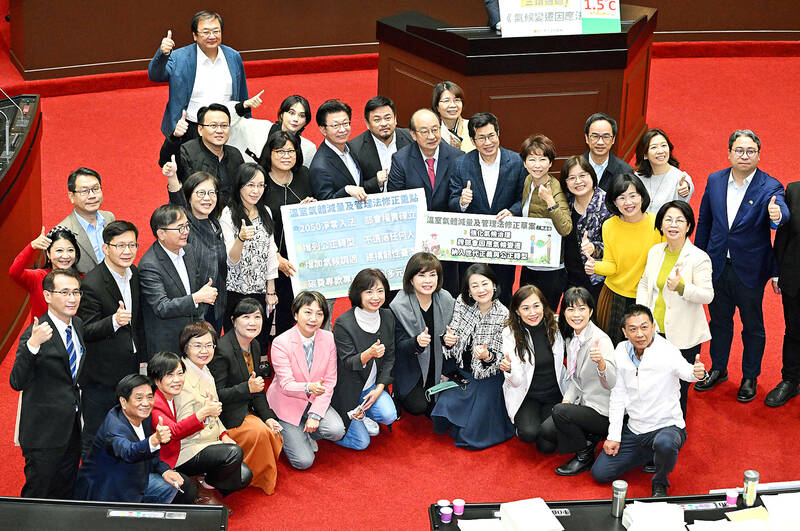The legislature yesterday passed amendments to climate change laws, officially setting 2050 as the deadline to achieve carbon neutrality and establish a carbon pricing system.
The Executive Yuan in April last year proposed the amendments to the Greenhouse Gas Reduction and Management Act (溫室氣體減量及管理法), which among other changes renames it the Climate Change Adaptation Act (氣候變遷因應法).
Since then, the bill has gone through committee and cross-party negotiations at the legislature, but consensus remained elusive on provisions such as the 2050 goal, oversight and carbon pricing.

Photo: Liao Chen-huei, Taipei Times
The legislature yesterday voted on the remaining provisions and the Democratic Progressive Party’s versions passed due to its majority.
If approved by the Executive Yuan, the bill would establish a national goal of achieving carbon neutrality by 2050.
To achieve this, it instructs all levels of government to work with citizens, businesses and civil groups to reduce emissions, as well as promote negative emissions technologies and international cooperation.
It would task the Executive Yuan’s National Council of Sustainable Development with negotiating, delegating and coordinating national responses to climate change, while the central government would be ordered to develop an action plan that is reviewed at least once every four years.
Local governments would work with experts and civil groups to form an implementation strategy that meets the requirements of the national action plan, which would be sent to a dedicated committee to execute, the bill says.
For economic incentives, the final version establishes a carbon taxing mechanism, with the central government as the sole collector.
If a payer is able to meet carbon reduction goals by converting to low or zero-carbon fuel, adopting negative emissions technology, improving energy efficiency or improving manufacturing, they would be eligible for a preferential rate.
Entities that intentionally report false information or alter data would be subject to a doubled fee plus interest.
Importers would be required to declare emissions linked to their products and pay accordingly.
All proceeds must be allocated to a climate change response fund, which is to be used for emissions source inspections, national and local carbon reduction efforts, subsidies and rewards for businesses working on greenhouse gas reduction technologies, transitional justice and other related matters, the bill says.
A public report detailing allocation of the funds and results must be made every two years, it says.
It also bolsters provisions for training, and promoting research into carbon technologies, and adds mechanisms to improve transparency and promote public participation.
The Environmental Protection Administration is to work out details of the carbon pricing scheme, which is to be implemented next year at the earliest.
The first stage of the rollout would target about 287 companies that emit at least 25,000 tonnes of carbon annually, comprising nearly 80 percent of the nation’s emissions.

Taiwan is stepping up plans to create self-sufficient supply chains for combat drones and increase foreign orders from the US to counter China’s numerical superiority, a defense official said on Saturday. Commenting on condition of anonymity, the official said the nation’s armed forces are in agreement with US Admiral Samuel Paparo’s assessment that Taiwan’s military must be prepared to turn the nation’s waters into a “hellscape” for the Chinese People’s Liberation Army (PLA). Paparo, the commander of the US Indo-Pacific Command, reiterated the concept during a Congressional hearing in Washington on Wednesday. He first coined the term in a security conference last

A magnitude 4.3 earthquake struck eastern Taiwan's Hualien County at 8:31am today, according to the Central Weather Administration (CWA). The epicenter of the temblor was located in Hualien County, about 70.3 kilometers south southwest of Hualien County Hall, at a depth of 23.2km, according to the administration. There were no immediate reports of damage resulting from the quake. The earthquake's intensity, which gauges the actual effect of a temblor, was highest in Taitung County, where it measured 3 on Taiwan's 7-tier intensity scale. The quake also measured an intensity of 2 in Hualien and Nantou counties, the CWA said.

The Overseas Community Affairs Council (OCAC) yesterday announced a fundraising campaign to support survivors of the magnitude 7.7 earthquake that struck Myanmar on March 28, with two prayer events scheduled in Taipei and Taichung later this week. “While initial rescue operations have concluded [in Myanmar], many survivors are now facing increasingly difficult living conditions,” OCAC Minister Hsu Chia-ching (徐佳青) told a news conference in Taipei. The fundraising campaign, which runs through May 31, is focused on supporting the reconstruction of damaged overseas compatriot schools, assisting students from Myanmar in Taiwan, and providing essential items, such as drinking water, food and medical supplies,

Prosecutors today declined to say who was questioned regarding alleged forgery on petitions to recall Democratic Progressive Party (DPP) legislators, after Chinese-language media earlier reported that members of the Chinese Nationalist Party (KMT) Youth League were brought in for questioning. The Ministry of Justice Investigation Bureau confirmed that two people had been questioned, but did not disclose any further information about the ongoing investigation. KMT Youth League members Lee Hsiao-liang (李孝亮) and Liu Szu-yin (劉思吟) — who are leading the effort to recall DPP caucus chief executive Rosalia Wu (吳思瑤) and Legislator Wu Pei-yi (吳沛憶) — both posted on Facebook saying: “I